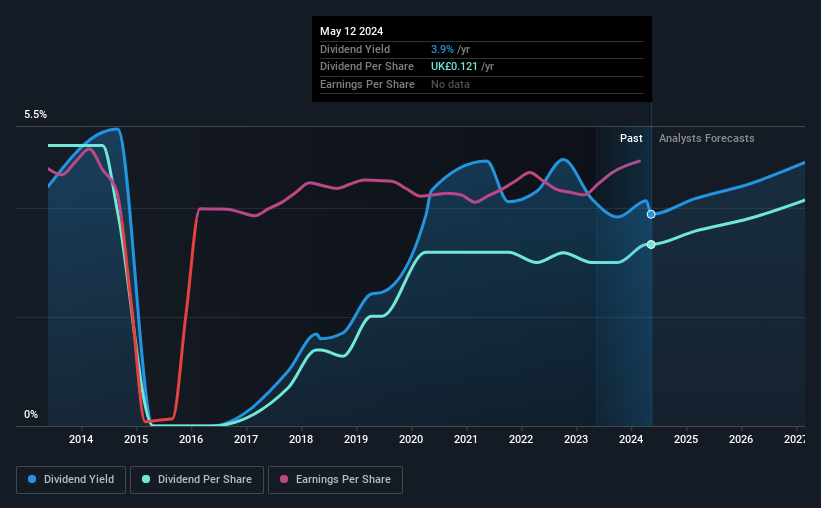- United Kingdom
- /
- Food and Staples Retail
- /
- LSE:TSCO
Tesco PLC (LON:TSCO) Looks Like A Good Stock, And It's Going Ex-Dividend Soon

Tesco PLC (LON:TSCO) is about to trade ex-dividend in the next 3 days. The ex-dividend date is one business day before the record date, which is the cut-off date for shareholders to be present on the company's books to be eligible for a dividend payment. The ex-dividend date is an important date to be aware of as any purchase of the stock made on or after this date might mean a late settlement that doesn't show on the record date. Thus, you can purchase Tesco's shares before the 16th of May in order to receive the dividend, which the company will pay on the 28th of June.
The company's next dividend payment will be UK£0.0825 per share, on the back of last year when the company paid a total of UK£0.12 to shareholders. Calculating the last year's worth of payments shows that Tesco has a trailing yield of 3.9% on the current share price of UK£3.117. If you buy this business for its dividend, you should have an idea of whether Tesco's dividend is reliable and sustainable. As a result, readers should always check whether Tesco has been able to grow its dividends, or if the dividend might be cut.
See our latest analysis for Tesco
Dividends are typically paid from company earnings. If a company pays more in dividends than it earned in profit, then the dividend could be unsustainable. That's why it's good to see Tesco paying out a modest 49% of its earnings. Yet cash flows are even more important than profits for assessing a dividend, so we need to see if the company generated enough cash to pay its distribution. Thankfully its dividend payments took up just 32% of the free cash flow it generated, which is a comfortable payout ratio.
It's encouraging to see that the dividend is covered by both profit and cash flow. This generally suggests the dividend is sustainable, as long as earnings don't drop precipitously.
Click here to see the company's payout ratio, plus analyst estimates of its future dividends.

Have Earnings And Dividends Been Growing?
Businesses with strong growth prospects usually make the best dividend payers, because it's easier to grow dividends when earnings per share are improving. Investors love dividends, so if earnings fall and the dividend is reduced, expect a stock to be sold off heavily at the same time. This is why it's a relief to see Tesco earnings per share are up 8.7% per annum over the last five years. Management have been reinvested more than half of the company's earnings within the business, and the company has been able to grow earnings with this retained capital. We think this is generally an attractive combination, as dividends can grow through a combination of earnings growth and or a higher payout ratio over time.
Many investors will assess a company's dividend performance by evaluating how much the dividend payments have changed over time. Tesco has seen its dividend decline 4.3% per annum on average over the past 10 years, which is not great to see. Tesco is a rare case where dividends have been decreasing at the same time as earnings per share have been improving. It's unusual to see, and could point to unstable conditions in the core business, or more rarely an intensified focus on reinvesting profits.
The Bottom Line
Should investors buy Tesco for the upcoming dividend? Earnings per share have been growing moderately, and Tesco is paying out less than half its earnings and cash flow as dividends, which is an attractive combination as it suggests the company is investing in growth. We would prefer to see earnings growing faster, but the best dividend stocks over the long term typically combine significant earnings per share growth with a low payout ratio, and Tesco is halfway there. Tesco looks solid on this analysis overall, and we'd definitely consider investigating it more closely.
With that in mind, a critical part of thorough stock research is being aware of any risks that stock currently faces. Our analysis shows 1 warning sign for Tesco and you should be aware of it before buying any shares.
A common investing mistake is buying the first interesting stock you see. Here you can find a full list of high-yield dividend stocks.
Valuation is complex, but we're here to simplify it.
Discover if Tesco might be undervalued or overvalued with our detailed analysis, featuring fair value estimates, potential risks, dividends, insider trades, and its financial condition.
Access Free AnalysisHave feedback on this article? Concerned about the content? Get in touch with us directly. Alternatively, email editorial-team (at) simplywallst.com.
This article by Simply Wall St is general in nature. We provide commentary based on historical data and analyst forecasts only using an unbiased methodology and our articles are not intended to be financial advice. It does not constitute a recommendation to buy or sell any stock, and does not take account of your objectives, or your financial situation. We aim to bring you long-term focused analysis driven by fundamental data. Note that our analysis may not factor in the latest price-sensitive company announcements or qualitative material. Simply Wall St has no position in any stocks mentioned.
About LSE:TSCO
Tesco
Operates as a grocery retailer in the United Kingdom, Republic of Ireland, the Czech Republic, Slovakia, and Hungary.
Undervalued with adequate balance sheet.
Similar Companies
Market Insights
Community Narratives



